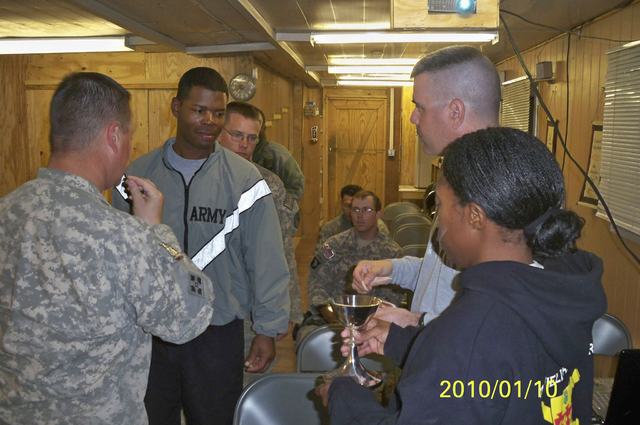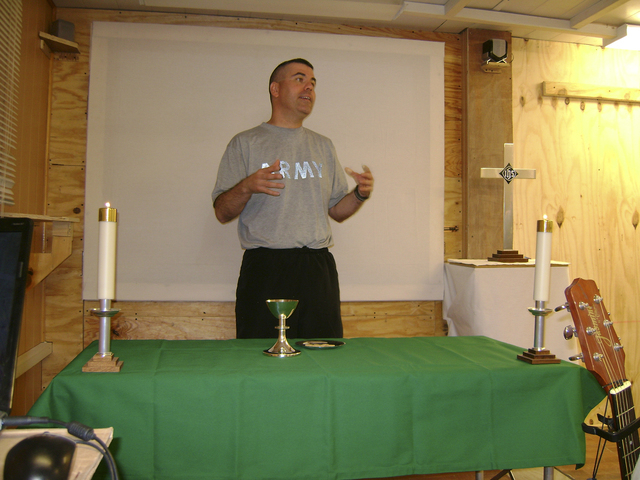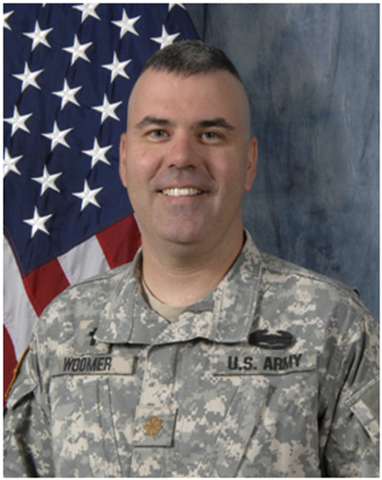Wartime challenges faith for military
As a military chaplain for the Nevada National Guard, Maj. Harold Woomer Jr. has learned there are no certainties when it comes to how soldiers are going to react to the cross on his uniform, especially in wartime.
Some have asked for baptisms so they could make peace with God before their deployments. For one serviceman in the middle of field training, Woomer performed the holy sacrament with a bottle of water.
While serving a five-month tour in Afghanistan in 2010, many of the troops saw the chaplain as their good luck charm. No matter their religious beliefs — an abundant supply or lack thereof — they figured it was fortunate to be riding alongside a noncombatant Methodist minister.
“They have a sense of strength that comes from the fact that there’s this crazy guy out there with, in my case, a cross on his uniform who’s doing everything that they’re doing, including going out on those patrols, without a weapon,” Woomer said.
And, of course, he has met soldiers with no spiritual convictions whatsoever. The old saying, “There are no atheists in foxholes,” falls far from reality, he said.
What war often does is bring faith to the surface in all its forms — the superstitious, the kind that desperately questions, the kind that’s found, the nonexistent. The belief system someone takes to the battlefield, in fact, isn’t necessarily what they bring home.
There isn’t a lot of research on soldiers and faith. A 2011 Pew Research Center poll called “War and Sacrifice in the Post-9/11 Era” noted that about 30 percent of the veterans reported no particular religious affiliation. Since most veterans are young adults, the figure simply fell in line with the overall population of younger Americans, according to the study. Only 18 percent of the general public as a whole, however, reported no religious affiliation.
The survey data show that those with higher levels of religious belief, as measured by how frequently they attend religious services, seem to have significantly better odds at making an easier readjustment to civilian life.
Yet, talk to local pastors and they point out that returning veterans are often reluctant to discuss their time overseas, let alone how it has affected their religious convictions. And unless a clergyman has experienced the trauma of war, it’s impossible to understand what the soldiers have gone through, Woomer noted.
“So it’s much harder to care for them in those moments of need because, quite frankly, you just don’t get it,” he said.
When Army Sgt. Andre Pigott deployed to Afghanistan 2½ years ago, he carried with him a deep Christian faith that started to take root when he was a child.
He lived on the Moapa River Reservation north of Las Vegas and spent a lot of time at his best friend’s house while his single mom worked long hours. It gave him ample opportunity to watch and listen as the family studied “the Word, and God, and all that stuff,” he said.
He also remembers congregants from the Church of the Nazarene in Overton showing up at the reservation and handing out Bible-study materials they pulled around in a little wagon. On Sundays, he would tag along to that same church with his friend’s family and, as he got older, continued to pray and study Scripture on his own.
Years later, when he was considering a stint in the service, Pigott and his wife prayed for guidance. Feeling he had his answer, the young father eventually trained to be an Army infantry medic and by December 2011 was deployed to Afghanistan for combat duty.
During his yearlong tour, Pigott lived in a mud hut “in the middle of nowhere” with both infantry and special forces soldiers as part of a joint task force “to let the (Afghans) know we’re there, to help them build their nation back up,” he said.
The soldiers’ duties included patrolling the villages and destroying explosives set up by the Taliban.
For Pigott, it also meant patching together injured U.S. soldiers, enemy combatants and villagers, including children. His unit’s small compound, outside the safer confines of a large base camp, was a regular target of enemy fire such as rockets and rocket-propelled grenades, Pigott added.
“It was a challenging place to be,” he said.
In the wake of the suffering he witnessed during the war, Pigott, who is 34, said his faith is still “the glue that holds me together.” It provides the hope and strength to move forward in times of adversity, he said, and without it, there is simply a void that can’t be filled.
“(Some soldiers) don’t understand why God would allow all that, so they blame him. And, you know, that’s their choice, that’s their decision, I’m not going to make that one.
“I’ve been there before. It’s a dark place to be. You’re empty,” he said.
For Woomer, the intensity of his time in Afghanistan changed his faith in a way that “will probably be a lifetime journey to figure out,” he said.
At one point during his deployment, he was responsible for ministering to about 1,300 troops as a personal and spiritual counselor, conductor of religious services, as well as adviser to the commanders on issues of ethics and morale.
His squadron had the mission of rebuilding infrastructure such as roads and water projects, and also conducted operations in Laghman Province.
Although most of the soldiers understood that they were helping the Afghan people and there was comfort in that knowledge, this was coupled with the realities of war and mortality. There were no deaths in Woomer’s unit, but his brigade lost 74 soldiers.
“You had soldiers who were going out on a daily basis, many of whom knew that as soon as they left the wire that there was a high probability they were going to get hit with an (explosive) before they came back in that night,” said Woomer, who is 44.
In the midst of it all, he witnessed soldiers without any faith, soldiers whose faith was strengthened and those who seemed to be grasping at whatever gave them a sense of peace. Woomer tells the story of an agnostic who practiced Eastern meditation and was adamant that he wasn’t a Christian, yet attended the chaplain’s services regularly.
There were also those with no belief who would still ask him to say a prayer or blessing and “be very reverent in that moment,” he said.
There was an overall tendency among the troops to push aside thoughts of the trivial and reflect on what really mattered in their lives. He witnessed “real questions of ultimate importance,” over and over again, he said.
It was, in fact, the most profound ministry of his career, he said.
“When you’re sitting across the chow-hall table or when you go out to the motor pool to talk to the guys and see how they’re doing … you’d have conversations like, ‘You know, when I get back, my family’s going to be my No. 1 priority,’ or ‘I really know what’s important now, I need to spend more time with my kids,’ ‘I want to put God at the center of my life’ … all those kinds of things,” he said.
“War changes you completely and it definitely necessarily changes your faith,” he added. “I think I’m in more awe of God today than I was. I don’t want so much to explain the mysteries of my faith any longer. I want more to experience it and to receive it than I want to explain it.”
























